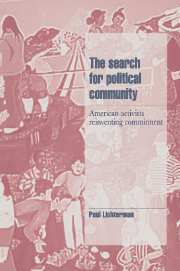Book contents
- Frontmatter
- Contents
- Acknowledgments
- 1 Personalism and political commitment
- 2 Personalized politics: the case of the US Greens
- 3 Speaking out in suburbia
- 4 Imagining community, organizing community
- 5 Culture, class, and life-ways of activism
- 6 Personalized politics and cultural radicalism since the 1960s
- 7 The search for political community
- Appendix I Choosing and studying the organizations
- Appendix II Why participant-observation was necessary
- Notes
- References
- Index
Appendix II - Why participant-observation was necessary
Published online by Cambridge University Press: 23 January 2010
- Frontmatter
- Contents
- Acknowledgments
- 1 Personalism and political commitment
- 2 Personalized politics: the case of the US Greens
- 3 Speaking out in suburbia
- 4 Imagining community, organizing community
- 5 Culture, class, and life-ways of activism
- 6 Personalized politics and cultural radicalism since the 1960s
- 7 The search for political community
- Appendix I Choosing and studying the organizations
- Appendix II Why participant-observation was necessary
- Notes
- References
- Index
Summary
WHY INTERVIEWS WERE NOT ENOUGH
One way to discover how and why activists have committed themselves to a cause is to ask them. During an interview with Barb, a member of ACES, I learned that a lot of people she knew at work and on her softball team would have ridiculed her anti-toxics activism had they known about it. Barb preferred to be known as a good baseball player, not an activist. The portion of the county that she lived in relied on Microtech, the military contractor located there, for a significant number of jobs. The company had polluted local groundwater, and had emitted toxic smoke and gasses into the air in several documented and an unknown number of undocumented incidents. Barb's group focused on these issues with the goal of drawing more local residents into discussion about Microtech. But to many area residents, it was not polite to question the contractor; to some, it was irrational.
So during the interview, I asked how she knew that her activism was the right thing to do.
Well, it's my nursing background. I'm able to read some of the technical books that come out – I'm able to understand some of the chemistry of groundwater pollution … having taken care of cancer patients, having been there when they come out of surgery … having learned what I've learned about them (the company) and how they operate and how they hide things, I don't trust them.
But this did not strike Barb as a completely satisfactory answer.
- Type
- Chapter
- Information
- The Search for Political CommunityAmerican Activists Reinventing Commitment, pp. 237 - 242Publisher: Cambridge University PressPrint publication year: 1996

